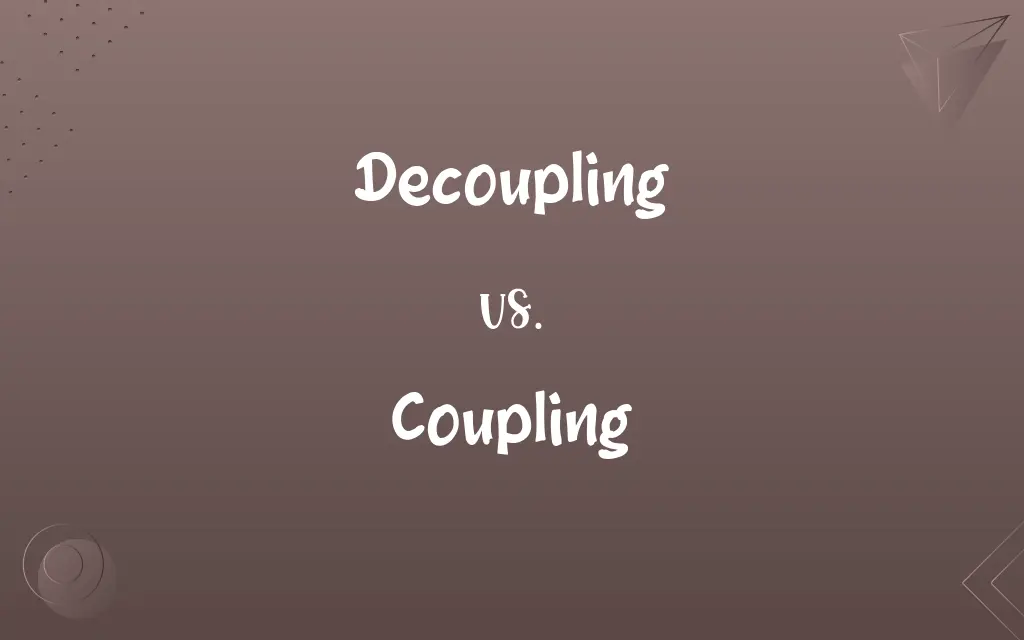Decoupling vs. Coupling: Know the Difference

By Shumaila Saeed || Updated on December 29, 2023
Decoupling refers to the process of separating or detaching elements that were previously connected or related. Coupling is the process of linking or combining elements together.

Key Differences
Decoupling involves disassociating elements that were previously integrated, leading to independent operation or function. In contrast, Coupling refers to the integration or joining of different elements, promoting interdependence and collective functioning.
Shumaila Saeed
Dec 29, 2023
In the context of systems or processes, Decoupling allows for individual components to operate or change without significantly affecting others. On the other hand, Coupling implies that changes or actions in one component directly influence or are influenced by other components.
Shumaila Saeed
Dec 29, 2023
Decoupling enhances flexibility and adaptability, as it reduces dependencies between elements. Conversely, Coupling often signifies a tighter, more coordinated interaction, which can improve efficiency but may also increase vulnerability to cascading failures.
Shumaila Saeed
Dec 29, 2023
Decoupling is often pursued to mitigate risks and enhance resilience, allowing one part to evolve or fail without major impact on the whole. In contrast, Coupling can optimize performance and coherence but may make the system more susceptible to systemic risks.
Shumaila Saeed
Dec 29, 2023
In terms of design and strategy, Decoupling can be a conscious choice to promote autonomy and ease of maintenance. Coupling, however, is often chosen to ensure consistency, uniformity, and streamlined communication or processes.
Shumaila Saeed
Dec 29, 2023
ADVERTISEMENT
Comparison Chart
Dependency
Reduces dependency between elements.
Increases dependency between elements.
Shumaila Saeed
Dec 29, 2023
Flexibility
Enhances flexibility and adaptability.
May reduce flexibility due to interdependencies.
Shumaila Saeed
Dec 29, 2023
Risk Management
Mitigates risks by isolating failures.
Risks are shared, leading to potential cascades.
Shumaila Saeed
Dec 29, 2023
Performance
Can lead to varied performance in elements.
Aims for uniform, optimized performance.
Shumaila Saeed
Dec 29, 2023
Maintenance
Simplifies maintenance by isolating components.
Maintenance may require holistic approach.
Shumaila Saeed
Dec 29, 2023
ADVERTISEMENT
Decoupling and Coupling Definitions
Decoupling
Decoupling is the process of separating interconnected parts.
The decoupling of the two companies allowed them to pursue independent goals.
Shumaila Saeed
Dec 29, 2023
Coupling
Coupling is creating operational interdependence between elements.
By coupling the marketing and sales strategies, the company boosted its revenue.
Shumaila Saeed
Dec 29, 2023
Decoupling
Decoupling is creating operational independence between elements.
By decoupling the database from the application, we improved performance.
Shumaila Saeed
Dec 29, 2023
Coupling
Coupling is attaching parts to form a unified system.
The coupling of various modules created a more integrated software solution.
Shumaila Saeed
Dec 29, 2023
Decoupling
Decoupling refers to reducing dependencies in a system.
Decoupling the software modules increased system stability.
Shumaila Saeed
Dec 29, 2023
ADVERTISEMENT
Coupling
Coupling is the process of joining or linking parts together.
The coupling of the two systems enhanced data synchronization.
Shumaila Saeed
Dec 29, 2023
Decoupling
Decoupling is the act of disassociating elements from a collective entity.
The decoupling of renewable energy from traditional grids has accelerated green initiatives.
Shumaila Saeed
Dec 29, 2023
Coupling
Coupling refers to increasing interdependencies in a system.
Greater coupling in the team led to more cohesive project outcomes.
Shumaila Saeed
Dec 29, 2023
Decoupling
(Electronics) To reduce or eliminate the coupling of (one circuit or part to another).
Shumaila Saeed
Oct 19, 2023
Decoupling
(Physics) To decrease or eliminate airborne shock waves from (an explosion) by having it take place underground.
Shumaila Saeed
Oct 19, 2023
Decoupling
To separate or detach
"Bipeds have a potential advantage over quadrupeds in decoupling their breathing from their locomotion" (Craig Stanford).
Shumaila Saeed
Oct 19, 2023
Coupling
(Electronics) The transfer of electricity from one circuit to another.
Shumaila Saeed
Oct 19, 2023
Coupling
(Chemistry) Facilitation or acceleration of one chemical process due to the presence or action of another.
Shumaila Saeed
Oct 19, 2023
Decoupling
Decoupling is detaching parts that were previously connected.
The project's success hinged on the decoupling of its various phases.
Shumaila Saeed
Dec 29, 2023
Coupling
The body part of a four-footed animal that connects the hindquarters to the forequarters.
Shumaila Saeed
Oct 19, 2023
Coupling
(software engineering) The degree of reliance between two or more software modules.
Shumaila Saeed
Oct 19, 2023
Coupling
(electronics) A connection between two electronic circuits such that a signal can pass between them.
Shumaila Saeed
Oct 19, 2023
Coupling
(physics) The property of physical systems that they are interacting with each other
Shumaila Saeed
Oct 19, 2023
Coupling
A device or contrivance which serves to couple or connect adjacent parts or objects; as, a belt coupling, which connects the ends of a belt; a car coupling, which connects the cars in a train; a shaft coupling, which connects the ends of shafts.
Shumaila Saeed
Oct 19, 2023
Coupling
A connection (like a clamp or vise) between two things so they move together
Shumaila Saeed
Oct 19, 2023
Coupling
A mechanical device that serves to connect the ends of adjacent objects
Shumaila Saeed
Oct 19, 2023
Coupling
The act of pairing a male and female for reproductive purposes;
The casual couplings of adolescents
The mating of some species occurs only in the spring
Shumaila Saeed
Oct 19, 2023
Coupling
Coupling is the act of associating elements with a collective entity.
The coupling of renewable energy sources with storage technologies has been a game changer.
Shumaila Saeed
Dec 29, 2023
Repeatedly Asked Queries
Can decoupling improve system resilience?
Yes, decoupling can enhance system resilience by isolating failures within individual components.
Shumaila Saeed
Dec 29, 2023
What are the risks of excessive coupling?
Excessive coupling can lead to cascading failures and difficulty in isolating issues.
Shumaila Saeed
Dec 29, 2023
What is decoupling in a technical context?
Decoupling in a technical context refers to separating components or systems to reduce interdependencies.
Shumaila Saeed
Dec 29, 2023
Is decoupling always advantageous in software development?
While decoupling can improve flexibility and maintenance, it may also increase complexity in software development.
Shumaila Saeed
Dec 29, 2023
How does coupling impact risk management?
Coupling can complicate risk management by linking the fate of interconnected components.
Shumaila Saeed
Dec 29, 2023
What is the role of decoupling in modular design?
Decoupling is key in modular design, allowing individual modules to function independently.
Shumaila Saeed
Dec 29, 2023
How does coupling affect system design?
Coupling in system design leads to more integrated and interdependent components, affecting overall system behavior.
Shumaila Saeed
Dec 29, 2023
Can coupling improve operational efficiency?
Yes, coupling can enhance operational efficiency through coordinated and unified processes.
Shumaila Saeed
Dec 29, 2023
Can coupling lead to increased complexity?
Yes, coupling can increase system complexity due to added interdependencies.
Shumaila Saeed
Dec 29, 2023
Is coupling beneficial in team dynamics?
Coupling can be beneficial in team dynamics by fostering closer collaboration and shared goals.
Shumaila Saeed
Dec 29, 2023
How does coupling affect change management?
Coupling complicates change management, as changes in one area may impact other interconnected areas.
Shumaila Saeed
Dec 29, 2023
How does decoupling affect maintenance?
Decoupling simplifies maintenance by allowing individual components to be serviced independently.
Shumaila Saeed
Dec 29, 2023
Is decoupling advantageous in large organizations?
Decoupling can be advantageous in large organizations by promoting flexibility and reducing systemic risks.
Shumaila Saeed
Dec 29, 2023
Can coupling enhance data integration?
Yes, coupling can significantly enhance data integration and consistency across systems.
Shumaila Saeed
Dec 29, 2023
Is coupling important for workflow integration?
Yes, coupling is important for effective workflow integration and streamlined processes.
Shumaila Saeed
Dec 29, 2023
Is coupling necessary for integrated systems?
Yes, coupling is essential for the functionality of highly integrated systems.
Shumaila Saeed
Dec 29, 2023
What are the trade-offs between decoupling and coupling in system architecture?
The trade-offs include balancing flexibility and independence (decoupling) against efficiency and coherence (coupling).
Shumaila Saeed
Dec 29, 2023
Can decoupling lead to performance issues?
Decoupling can sometimes lead to performance issues due to the lack of integrated optimization.
Shumaila Saeed
Dec 29, 2023
How does decoupling facilitate innovation?
Decoupling facilitates innovation by allowing separate components to evolve independently.
Shumaila Saeed
Dec 29, 2023
How does decoupling impact scalability?
Decoupling often improves scalability by allowing components to be scaled independently.
Shumaila Saeed
Dec 29, 2023
Share this page
Link for your blog / website
HTML
Link to share via messenger
About Author
Written by
Shumaila SaeedShumaila Saeed, an expert content creator with 6 years of experience, specializes in distilling complex topics into easily digestible comparisons, shining a light on the nuances that both inform and educate readers with clarity and accuracy.









































































